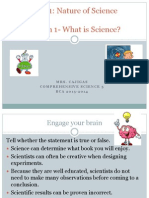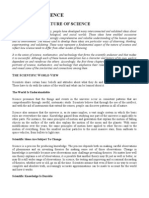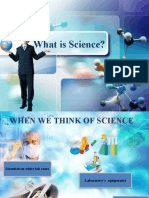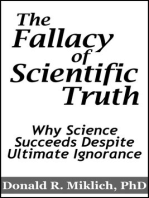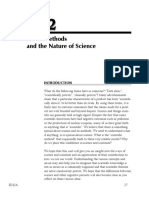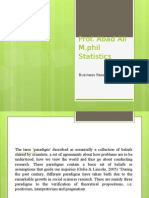Research Methodology
Research Methodology
Uploaded by
maya75750Copyright:
Available Formats
Research Methodology
Research Methodology
Uploaded by
maya75750Original Description:
Original Title
Copyright
Available Formats
Share this document
Did you find this document useful?
Is this content inappropriate?
Copyright:
Available Formats
Research Methodology
Research Methodology
Uploaded by
maya75750Copyright:
Available Formats
RM-1.1 Characteristics of Science and research Characteristics of Science Understanding Scientists and their Work What is science?
How does science work? What are scientists like? Most people have given little thought to these sorts of questions, yet often possess surprisingly entrenched misconceptions of each. These strongly held opinions are often formed from everyday media portrayals of science and scientists found in movies, television programs, commercials and advertisements, and popular literature. School science classes from elementary school through college also send persistent messages regarding what science and scientists are like and how science is done. Unfortunately, both the media and school science often inaccurately portray what authentic science and scientists are like. Thus, the impressions many people hold are likely mistaken in many important ways. The benefits of accurately understanding the characteristics of science include a more scientifically literate society, a public that is more supportive of science, a more informed use of scientific knowledge, and a reduced flight of capable students out of science career tracks. Science Is Not the Same as Technology Many people know that while football is related to the game of rugby, the two are not the same. And American football and Australian football are just two kinds of football. This same sort of confusion occurs regarding different kinds of science and their relation to technology. While science and technology do impact each other, basic science is not directly concerned with practical societal outcomes. While scientists do reason through problems, the methods they use result from a number of factors the kind of phenomena being explored, the specific problem at hand, existing scientific knowledge and thinking, available resources, serendipitous events, and the investigator's preferences, imagination and creativity. This is why the physicist and Nobel Laureate, Percy Bridgman, once claimed that the scientific method, insofar as it is a method, is nothing more than doing one's damnedest with one's mind, no holds barred. Scientists tend to use whatever methods and approaches that will shed insight onto a research problem. For instance, many well-established science ideas did not come about from experiments. Experiments are often useful in science, but they have limits. Some of the most fundamental ideas in science were not developed or established through conducting experiments, but by other means such as observation, model building, and other approaches. In some fields of science, conducting experiments or having an experimental control is not even possible. Even in scientific disciplines where experiments are prevalent, the notion of a rigid scientific method simply does not reflect what actual scientists do. Doing Science Well Requires Imagination and Creativity Nobel Laureate Peter Medawar argued that although scientific papers are written in a manner to best communicate and persuade readers of the logic behind the reported work, the format implies to non-scientists that researchers actually follow a step-by-step method. Left out of scientific papers are the hunches, dead ends, creative insights, extensive discussions, and other occurrences that make clear science is a human process. Thus, what does appear in scientific papers implies that scientists follow a step-by-step scientific method. Conveying a definite structure to scientific methodology wrongly leads students to think that experiments are the only route to understanding the natural world, that imagination and creativity play little if any role in research, that the success of science is due to a purely logical step-bystep method, and that this method separates science from other disciplines. Actual research is far messier and demands imagination and creativity to generate ideas never before considered. Einstein once remarked that imagination is more important than knowledge for that is where novelty arises. He claimed that his ideas regarding relativity emerged from his imagining what riding on a beam of light would be like. John Dewey once said that Every great advance in science has issued from a new audacity of imagination. The Generation and Acceptance Often Takes Much Time Science textbooks often give the impression that credible scientific ideas were generated and accepted rather quickly. But typically much time passes as questions are conceived, ideas are put forward, debated, modified, become credible, and are eventually accepted by the scientific community. A variety of reasons account for the length of time required for scientific questions to be confidently answered. Sometimes asking the precise question that will lead to productive research can be very challenging and much time may pass pursuing unproductive questions. Moreover, unlike most school laboratory experiences, scientists conducting authentic research do not have a set of instructions to follow in pursuing their questions. And the data that is collected do not tell scientists what to think. Rather, scientists must determine what data are significant, what data to ignore, and generate ideas that will make sense of the data. Once generated, ideas must be persuasive to the community of scientists who do research in that area. In authentic science, ideas emerge and are accepted over much time as scientists are persuaded that an idea is valid. As further research evidence and reasoning supports such ideas, they become so widely accepted by the researchers in the relevant field of research that, as the paleontologist Stephen J. Gould put it, withholding provisional consent would be
RM-1.1 Characteristics of Science and research perverse. New researchers are educated in the latest way of thinking and eventually that way of thinking is accepted as the way nature is. However, remember that scientists have no higher authority to seek out and ensure whether they are asking the most productive questions, are pursuing them appropriately, have correctly analyzed their data, and whether or not they have reached correct conclusions. Figuring all this out is what makes doing science so interesting and challenging. As Einstein noted, if all these decisions were straightforward and quick, it wouldn't be called research, would it? Science Has a Subjective Aspect Because science is a human endeavor, subjectivity or preconceived notions cannot be eliminated. The knowledge scientists bring to their research influences what questions they ask, how they go about pursuing answers to those questions, what data is deemed relevant and irrelevant, and what kinds of answers are plausible. Knowledge, as well as being a product of investigations, is also a tool for making further observations and deriving new knowledge. What scientists think and see is necessarily influenced by the previous thinking they bring to bear on their research. A more realistic view of how scientists and the scientific community work to check, but not eliminate subjectivity, includes an understanding of private science, public science, and their interactions. Private science refers to the inspiration, intuition, imagination and creative leaps that individual scientists make. Private science can also refer to the dynamics of research teams. The processes and ideas born in these close-knit situations can easily result in unwarranted conclusions and unexamined biases, but the process of publicly sharing ideas with the larger community of scientists acts to constrain subjectivity as methodologies and biases are examined and modified by the views of other scientists. Public science tempers, without eliminating, the subjective tendencies of private science. Well-Established Science Knowledge is Durable, but Always Open to Revision Knowledge about the natural world is not discovered like finding your lost car keys. Much effort, imagination, creativity and time is required to generate credible ideas and for those ideas to be accepted by the scientific community. Many people wrongly think of well-established scientific knowledge as proven truth, but this misses the important point that scientists can never know if they have the absolute truth of the matter (remember, they have no higher authority who can confirm their ideas). Science teachers often perpetuate this view by using words like prove and true without making clear to students what those words mean in a science context. Many arguments can be made against the notion of absolute truth in science, but Einstein and Infeld provide an easily understood analogy: In our endeavor to understand reality we are somewhat like a man trying to understand the mechanism of a closed watch. If he is ingenious he may form some picture of a mechanism which could be responsible for all the things he observes, but he may never be quite sure his picture is the only one which could explain his observations. He will never be able to compare his picture with the real mechanism and he cannot even imagine the possibility or the meaning of such a comparison. Because the watch can never be opened, asking whether our ideas concerning the natural world are absolutely true is to ask an unanswerable question. However unlikely, even the most cherished and well-established scientific knowledge could, in principle, be revised or replaced. That scientific knowledge is open to revision is one of the great strengths of science as a way of knowing. That even well-established scientific knowledge is not proven truth and thus potentially open to revision should not result in a loss of confidence in that knowledge. Well-established scientific knowledge is so well supported that withholding provisional consent would be ridiculous. And the many technologies responsible for lengthening our lives and easing everyday difficulties are built upon that well-established scientific knowledge. While we have good reason to place great confidence in well-established science ideas, all science knowledge is created by human beings and is thus always open to revision with new evidence and thinking. Well-Established Science Ideas Are Not Easily Abandoned That well-established scientific knowledge is potentially open to revision does not mean such knowledge is easily changed and for good reason! Unsolved puzzles and seemingly refuting evidence do not always result in rejection of an idea. Widely encompassing scientific ideas are always faced with anomalies phenomena that are poorly accounted for or perhaps even contradict an idea. The reasons for this are varied and detailed, but the crux of the matter is that comprehensive ideas are not discarded simply because some pieces do not fit. Many historical examples can be found where contradictory data did not result in abandonment of ideas that we today accept as good science. When well-established science knowledge is faced by apparently refuting evidence, the far greater likelihood is that the problem lies with the seemingly disconfirming instance or instances. For example, in the nineteenth century, scientists noted that observations of Uranus' orbit departed significantly from that predicted by Newton's gravitational law. While some scientists at the time speculated that the law of gravity might not apply at the distance of Uranus, most scientists, noting the enormous success of the Newtonian framework in other affairs, rightfully expected the anomaly to be accounted for without abandoning or modifying Newton's law. In 1835, years after the anomaly in Uranus' orbit was first recognized, the return of Halley's Comet sparked the idea that celestial bodies beyond Uranus might exert a force on the planet large enough to explain the planet's orbital discrepancy. This confidence, rather than seeing the anomaly as falsifying a well-supported idea, was crucial in the prediction and discovery of Neptune in 1846. This and other stories illustrate that apparently disconfirming evidence can, in time, usually be explained in terms of previously well-established knowledge. However, at other times, well-established prior ideas have, however reluctantly, been modified or abandoned.
RM-1.1 Characteristics of Science and research Hypotheses, Laws and Theories are Different, Yet Related Kinds of Knowledge The words theory, law, and hypothesis are frequently used in science classes, yet their appropriate meaning and relationship is rarely conveyed to students. Outside of science, the word theory is often interpreted as a guess or speculation. And many people wrongly think that hypotheses become theories and then laws as the certainty of the idea increases. However, while laws and theories are related to one another in complex ways, one never becomes the other. Laws are generalizations or universal relationships that express the way that the natural world behaves under specific conditions. Scientific theories predict and explain laws, and provide a kind of road map for further research. Not only are laws not a higher form of scientific knowledge, but an understanding of laws is incomplete without a theory to explain them. Consider, for example, that we have a law of gravity, but no well-established theory that explains precisely how bodies are attracted to one another. The scientific community's confidence in ideas concerning the natural world can range from speculative, gaining support, well supported, to near certain (but not proven truth!). Ideas that are speculative or are gaining support, but are not yet well-established are often referred to as hypotheses. Note that hypothesis can mean a guess or a well-informed speculation, and these two meanings might refer to a particular instance (an observation), a universal relationship (law), or an explanatory framework (theory). Hence, the word hypothesis has at least six different meanings. Speculative explanatory frameworks (theories) may, over time, become well established, but they are still theories. Speculative invariable relationships (laws) may also become well established, but they remain laws. Scientific theories and laws are different kinds of knowledge with different purposes. Thus, as evidence for a theory grows, it becomes better established, but it remains a theory. Science Provides Natural Explanations for Phenomena Scientific knowledge must, in principle, be testable. This means that obtaining conceivable evidence for or against a claim must be possible. Because science limits itself to testable ideas, explanations deferring to supernatural forces are not used in science. This stance is referred to as methodological naturalism. Most of us adopt this stance in our everyday lives, even though we might believe in a supernatural being. Imagine that your car mechanic tells you your car won't start because it is possessed by an evil spirit; most of us would demand a second opinion! Importantly, because science limits itself to naturalistic evidence and explanation, it is incapable of addressing questions regarding the supernatural science simply must ignore these kinds of questions. You might think of science and religion like playing two different games different means are used to reach each game's respective goals. Science sets out to understand the natural world in ways that human beings can comprehend and then manipulate through technology. This approach to explaining natural phenomena without reference to the supernatural has undeniably been successful and has provided scientific explanations for phenomena that in the past were attributed solely to supernatural intervention. Future efforts will undoubtedly result in even more powerful explanations that make no reference to the supernatural. The scientific community's demand for empirical evidence and naturalistic explanations, in part, account for its success at establishing reliable knowledge about the world. However, these demands also set up boundaries that preclude it from investigating or making claims about what matters most to people. For instance, matters of spirituality, morality, and the meaning of life are not amendable to scientific investigation. One commentator wrote that The fact that science cannot find any purpose to the universe does not mean there is not one. We are free to construct parables for our moral edification. Importantly, science does not and cannot deny the existence of the supernatural. In their personal lives, many scientists have a deep faith in a God, but when they do science they work to understand our world and the universe in naturalistic terms, the same as with researchers who look for a non-supernatural cause for disease. Explanations using supernatural events and/or deities are beyond nature and, thus, beyond the realm of science. The word supernatural means beyond nature. Science deals with the natural world and, consequently, scientific explanations must be based in natural expressions with no reference to the supernatural. Science and religion are like two different games with different rules and goals. Doing Science is a Social and Collaborative Process A scientist once said that if science really worked like the media and school science often portray, no one would be a scientist. One of the most common misconceptions of science and scientists is that of the solitary and introverted investigator working in a drab laboratory. Of course, at times a scientist may find her or himself working alone, but that's the case in most any career. But most often scientists work with others in all sorts of settings in nature doing field research, in the laboratory, and in the meetings common to all careers. Scientists must work together and do so in all aspects of research. Solving problems is more productive and enjoyable when collaborating with others, and most scientific problems are far too complex, time consuming, and demanding of resources to work alone.
You might also like
- The Hermetic Science of Transformation: The Initiatic Path of Natural and Divine MagicFrom EverandThe Hermetic Science of Transformation: The Initiatic Path of Natural and Divine MagicRating: 4.5 out of 5 stars4.5/5 (7)
- Resum Barry Feminist CriticismDocument6 pagesResum Barry Feminist Criticismcris otero100% (6)
- Social Construction - Ásta SveinsdóttirDocument9 pagesSocial Construction - Ásta Sveinsdóttirraumel romeroNo ratings yet
- Unit 1 Nature of ScienceDocument63 pagesUnit 1 Nature of Scienceapi-235066492No ratings yet
- Heidegger The Fundamental Concepts of Metaphysics PDFDocument200 pagesHeidegger The Fundamental Concepts of Metaphysics PDFLucilla GuidiNo ratings yet
- Benhabib-The Embattled Public SphereDocument25 pagesBenhabib-The Embattled Public SpherevincenzomarazziNo ratings yet
- Myths of ScienceDocument5 pagesMyths of ScienceDanielle Kate UgayNo ratings yet
- Wk1 - What Is ScienceDocument12 pagesWk1 - What Is Sciencechuaew100% (1)
- Curiosity and Observation Are The Start of ScienceDocument5 pagesCuriosity and Observation Are The Start of ScienceLorenaNo ratings yet
- 4 Scientific Process 060708Document41 pages4 Scientific Process 060708Ridwan Efendi100% (1)
- Misconceptions About Science UC Berkeley Jan 2014Document20 pagesMisconceptions About Science UC Berkeley Jan 2014ektaidnanyNo ratings yet
- Characteristics of Science NotesDocument5 pagesCharacteristics of Science Notesroxanne taylorNo ratings yet
- (GESTSOC) Group DiscussionDocument12 pages(GESTSOC) Group DiscussionDianne Reign GalangNo ratings yet
- Chapter 1 - The Nature of Science-1Document25 pagesChapter 1 - The Nature of Science-1jeizle017No ratings yet
- Human Flourishing HandoutDocument3 pagesHuman Flourishing HandoutThom Steve Ty100% (1)
- Scientific MethodDocument1 pageScientific MethodRoland ApareceNo ratings yet
- 1basic Science Unoraja 2022 PiloDocument40 pages1basic Science Unoraja 2022 Piloteamapexa2024No ratings yet
- Assignment 1: DEVC 208: Communication of Scientific and Technical InformationDocument8 pagesAssignment 1: DEVC 208: Communication of Scientific and Technical InformationMelvin EspinedaNo ratings yet
- What Is ScienceDocument1 pageWhat Is Scienceriyazulla223344No ratings yet
- STS Esm 412 ModuleDocument32 pagesSTS Esm 412 ModulesaadmwijakaNo ratings yet
- Ge7 3aDocument5 pagesGe7 3aMarven BorromeoNo ratings yet
- MST Week 9 Lesson 7 The Nature of ScienceDocument10 pagesMST Week 9 Lesson 7 The Nature of ScienceRamilNo ratings yet
- 4 Scientific Process 060708Document41 pages4 Scientific Process 060708Andargie GeraworkNo ratings yet
- Ch1 Sect 2 Science in Context PPT 1Document28 pagesCh1 Sect 2 Science in Context PPT 1Odur SolomonNo ratings yet
- Is Science Trustworthy - Part 1 - The Scientific MethodDocument24 pagesIs Science Trustworthy - Part 1 - The Scientific MethodShivam Kumar MishraNo ratings yet
- STS Module 3Document5 pagesSTS Module 3Joynah EscotonNo ratings yet
- Introduction To ScienceDocument8 pagesIntroduction To ScienceLorenaNo ratings yet
- All About ScienceDocument97 pagesAll About ScienceRommel Villaroman EstevesNo ratings yet
- Module 1-Nature of ScienceDocument9 pagesModule 1-Nature of ScienceAbe BautistaNo ratings yet
- Evolution FactsDocument14 pagesEvolution FactsjulianbreNo ratings yet
- Wa0033Document79 pagesWa0033tolameyanNo ratings yet
- The Nature of Science and The Scientific MethodDocument11 pagesThe Nature of Science and The Scientific Methoddarkot1234No ratings yet
- The Nature of Science and The Scientific MethodDocument11 pagesThe Nature of Science and The Scientific Methodpaquitobuu100% (1)
- Truth - SocialDocument5 pagesTruth - SocialChen CerroNo ratings yet
- Topic 1 GeoDocument16 pagesTopic 1 GeoBriar RoseNo ratings yet
- SCI-M-3114 - P 4-7 Chapter 1Document4 pagesSCI-M-3114 - P 4-7 Chapter 1CHENIE MISANo ratings yet
- Module 1-NATURE OF SCIENCE6Document10 pagesModule 1-NATURE OF SCIENCE6Charles CabarlesNo ratings yet
- Knowledge and ScienceDocument7 pagesKnowledge and ScienceNerinda RizkyNo ratings yet
- What Is ScienceDocument6 pagesWhat Is Scienceapi-500161804No ratings yet
- What Is PseudoscienceDocument11 pagesWhat Is PseudoscienceJohny_GR100% (1)
- STS Preliminary Term Synthesis I. Basic Concepts ScienceDocument22 pagesSTS Preliminary Term Synthesis I. Basic Concepts ScienceSherinne Jane CariazoNo ratings yet
- Myth 1: Hypotheses Become Theories Which Become LawsDocument2 pagesMyth 1: Hypotheses Become Theories Which Become LawsNaeem MushtaqNo ratings yet
- Topic 1 Scientific Thinking in ResearchDocument13 pagesTopic 1 Scientific Thinking in ResearchKhairiAkmal100% (1)
- Scientific MethodDocument17 pagesScientific MethodSara BurgessNo ratings yet
- Credit Economy and Economy Rationality of ScienceDocument32 pagesCredit Economy and Economy Rationality of Sciencedinosaur_laamNo ratings yet
- File 000Document20 pagesFile 000mokhtari raniaNo ratings yet
- The Fallacy of Scientific Truth: Why Science Succeeds Despite Ultimate IgnoranceFrom EverandThe Fallacy of Scientific Truth: Why Science Succeeds Despite Ultimate IgnoranceRating: 5 out of 5 stars5/5 (1)
- lecturenote_1913708007Chapter 1Document26 pageslecturenote_1913708007Chapter 1Demeke DanaNo ratings yet
- What Is Science?: Reducible To Simple UnderstandableDocument3 pagesWhat Is Science?: Reducible To Simple UnderstandableDev SwainNo ratings yet
- Am Bell Teach Nat Sci Scl22-0449aDocument6 pagesAm Bell Teach Nat Sci Scl22-0449aLhiya ShinHye HandrianiNo ratings yet
- What Is ScienceDocument4 pagesWhat Is ScienceMaye Zaidyle BorinagaNo ratings yet
- Module 1 4 StsDocument43 pagesModule 1 4 StsJhoanna Mae Alcantara100% (1)
- CB1 Unit 5Document27 pagesCB1 Unit 5info.xd.ovoNo ratings yet
- Sts Module No. 1 ActivityDocument5 pagesSts Module No. 1 ActivityAngelica Malacay RevilNo ratings yet
- Science & NonscienceDocument3 pagesScience & NonscienceAbhishekNo ratings yet
- What Is ScienceDocument35 pagesWhat Is ScienceCyrel Ann ArenasNo ratings yet
- Mod - 1unit2-Science Med and TecDocument58 pagesMod - 1unit2-Science Med and TecDenisha PhillipsNo ratings yet
- Nature of ScienceDocument14 pagesNature of SciencePablo Dula AdoraNo ratings yet
- Name: Martin, Freya Rica N. Score: - Course and Year: BSA-3A Date: Aug. 25, 2020Document2 pagesName: Martin, Freya Rica N. Score: - Course and Year: BSA-3A Date: Aug. 25, 2020Rhoans PhcNo ratings yet
- StsbagoDocument118 pagesStsbagoKj VillenaNo ratings yet
- Untitled Document 1Document2 pagesUntitled Document 1PuddingNo ratings yet
- Life's Origin, Recommended Separating Operation Science From OriginDocument15 pagesLife's Origin, Recommended Separating Operation Science From OriginanalianeNo ratings yet
- Lesson 1 Human Flourishing (PELEN) MARCH ACTIVITIESDocument3 pagesLesson 1 Human Flourishing (PELEN) MARCH ACTIVITIESMhelboy Gabejan AbalosNo ratings yet
- Meaning and Context Three Different Perspectives.Document6 pagesMeaning and Context Three Different Perspectives.Saiful LahidjunNo ratings yet
- Greek PhilosophersDocument34 pagesGreek Philosophers3SASHSChristian CreoNo ratings yet
- EXISTENSIALISMDocument22 pagesEXISTENSIALISMSheena Tiangha Ledesma100% (1)
- Nuevo Historicismo BibliografíaDocument3 pagesNuevo Historicismo Bibliografíaariadnatl77No ratings yet
- Prof. Abad Ali M.phil Statistics: Business Research MethodDocument11 pagesProf. Abad Ali M.phil Statistics: Business Research MethodFaizan ChNo ratings yet
- Yogacara Theory - Part Three - The Nature of RealityDocument4 pagesYogacara Theory - Part Three - The Nature of RealityThiện HoàngNo ratings yet
- Sentence and PropositionDocument15 pagesSentence and PropositionManika KhetarpalNo ratings yet
- Opposition PropositionDocument17 pagesOpposition Propositionmotz100% (2)
- What Is Marxist Literary CriticismDocument3 pagesWhat Is Marxist Literary Criticismapi-511285581No ratings yet
- 1.4 - John Locke's (1632-1704) Essay Concerning Human Understanding (1689) - Humanities LibreTextsDocument1 page1.4 - John Locke's (1632-1704) Essay Concerning Human Understanding (1689) - Humanities LibreTextsLex RoxNo ratings yet
- Davidson Structures&Strategies PDFDocument9 pagesDavidson Structures&Strategies PDFReidNo ratings yet
- Shifting GroundsDocument19 pagesShifting GroundsDouglas SadownickNo ratings yet
- Zizek-The Fragile AbsoluteDocument93 pagesZizek-The Fragile AbsoluteRebecca O' Dwyer100% (3)
- Post Marxism As Compromise Formation MeyersonDocument74 pagesPost Marxism As Compromise Formation MeyersonAsanij100% (1)
- The Scientific ParadigmDocument18 pagesThe Scientific ParadigmAbhishek G SNo ratings yet
- RKS - Settler-Colonialism (Aff)Document165 pagesRKS - Settler-Colonialism (Aff)mamey-limeNo ratings yet
- Agnosticism - Robert Flint PDFDocument622 pagesAgnosticism - Robert Flint PDFLuca AntonazzoNo ratings yet
- The Discourse of ParadigmDocument3 pagesThe Discourse of ParadigmloginfooNo ratings yet
- Raymond Williams' ConclusionDocument7 pagesRaymond Williams' ConclusionAbdelhak SaddikNo ratings yet
- Contributions of Immanuel Kant in The Field of Education By: AMRITA BHARTI M.Ed Ist SEMESTER 2016-2018Document15 pagesContributions of Immanuel Kant in The Field of Education By: AMRITA BHARTI M.Ed Ist SEMESTER 2016-2018Anuradha seth79% (14)
- Irigaray V Queer EcofemDocument26 pagesIrigaray V Queer EcofemAnonymous Bh6y0TuVHiNo ratings yet
- The Philosophy and Politics of Bruno Bauer by Douglas Moggach PDFDocument304 pagesThe Philosophy and Politics of Bruno Bauer by Douglas Moggach PDFbad joeNo ratings yet
- Philosophy Lesson Plan - ActivityDocument4 pagesPhilosophy Lesson Plan - ActivitySlaghard AnerajNo ratings yet
- Philosophy and Development of Education in MalaysiaDocument12 pagesPhilosophy and Development of Education in MalaysiaAbdul Ghaffar JaafarNo ratings yet
- Phenomenology Logic Philosophy MathematicsDocument369 pagesPhenomenology Logic Philosophy Mathematicsjumpit100% (4)
- History For Utopia - Saint-Simon and The Idea of ProgressDocument22 pagesHistory For Utopia - Saint-Simon and The Idea of ProgressRPNo ratings yet



